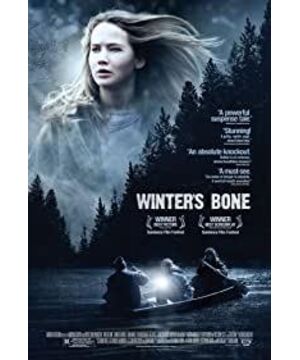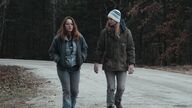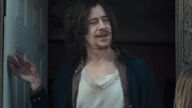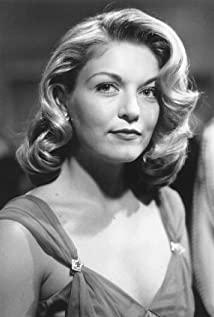Rui comes from a criminal family, all blood relatives and neighbors are immersed in the underworld. The world follows its own laws and rules, and women have no voice in this world because they have no power. When Ray went to Sam, Sam's wife frowned and asked: Can't you find a man to do this? When she was beaten, her uncle Tear asked (to a man): Did you move her? Sam's wife stood up and said: It was me and a few sisters who moved, and no man touched her. These are their laws and regulations. We can see that this is a world similar to the rivers and lakes described in Chinese martial arts novels. Women are essentially excluded from a world that speaks with violence and power. Rui had to bite the bullet and break in, because she was the last person who could protect the family.
Rui's face was pale, her hair was disheveled, her expression was exhausted, she looked very cold, and her eyes were full of defense, but she was very stoic and tenacious. She never complained about her unfortunate life, she just silently tried to accept it, doing everything possible to make it not worse. For her, keeping her mother and younger siblings alive is more important than anything else. Therefore, she never pursued who killed her father, because she was too weak in the world of criminals who were not bound by the law and obeyed their own laws. She just needed a proof, wanted the court to prove that her father was dead, to prove to herself that her father wasn't a coward who would abandon her family—to prove that she wasn't abandoned. As for her father's death or revenge, there was nothing she could do.
The search for the father is the main thread of the film, initially only to avoid being displaced by confiscated property. But as the trial period passed, finding the father no longer made any sense. Finding him can only prove that the man who was supposed to be the protector of the family is just a coward with no seeds, and that he, who was struggling to survive, was ruthlessly abandoned by his biological father. For this weather-beaten family, the death of the father was the best outcome. And how sad this is.
When I told a friend about this movie, she repeatedly asked: What about her father? Who the hell killed her father? Doesn't she take revenge? Is that the case? I have to explain that sometimes the truth is not so important, life is more important than the truth, more important than revenge. After all, the living are more important than the dead.
What is life? Is there a warm fire to keep you warm, is there a hot stew to satisfy your hunger, and is there a house to shelter from the wind and rain. In life, everything must be surrendered. Rui is reluctant to keep silent and risk her life to find the only reason for her father's whereabouts, but also to save her broken life. There is nothing more important than surviving - and if there is, it is family.
It is worth mentioning that Rui's uncle Tear, a drug dealer who has also been in the underworld for many years. At first he grimly refused to help Rui. He thought that Rui was just being stupid and that his brother had escaped from prison. But seeing the weak Rui risking her life for her family, and believing that her father did not escape, the old man's hard heart was moved too—perhaps he saw the shadow of his brother left on Rui. So he, like a hero, took Rui out of the trap of the Sam family, and gambled his own life, causing a commotion to force the Sam family to hand over some of the remains, and finally save the Rui family from living on the streets. Tear was never a good person, not even a good brother and uncle, but at the most difficult time for the family, like a real father, he protected the family in place of his older brother. At the end of the film he gave up revenge for his brother, but Rui did not blame him.
After all, being alive is more important than anything else.
The title of the film "Winter's Bone" refers to the bones of Rui's father sunk in the lake, which is the last hope for the family. We have seen many subjective shots imitating Rui's perspective in the movie. Every time she waits anxiously for the person at the door to decide whether to help her or not, the desolate wind, birdsong, and wind chimes are infinitely amplified. From the perspective of wandering and looking around, you can see how uneasy, anxious and fearful Rui is. In the cattle farm, Rui's voice was blurred and faded into the cow's cry, which conveyed her inner powerlessness to us. On the night after the beating, the film was inserted into the footage of a black-and-white documentary. The squirrels running around as the trees were felled in the footage were not only Rui's inseparable feelings for the woods, but also her lingering worries of being displaced. The insertion is abrupt but unmistakable, and the bleak music is chilling with the sound of chainsaws cutting and trees falling to the ground.
The tone of the whole film is gloomy and gloomy, and the cold air of the north is almost blowing from the screen. Only at the beginning of the film, with a soft and bleak singing voice, shows a big vision, and then relies on fragmented pictures to show us the living conditions of civilians in the Ozarks area of northwest Missouri - the original survival skills are still It's important, life is still hard. There is not much off-screen background music inserted in the film, and most of the time where there is no line in the film, there is a long silence, accompanied by thunder, wind, chickens, and dogs. Only two times when the search for his father's body was unsuccessful, a shallow BGM was inserted to express Rui's silent exhaustion, disappointment, and inexplicable relief that he had not seen his father's body in person. Rui's secret and tangled feelings for her father are implicitly expressed in these places. She does love her father, and is proud to some extent (for example, she once said that he never made a mistake in making drugs, that he would never run away by himself, there must be an accident); but she does resent herself 's father. She doesn't even know whether to hate more or love more, and subconsciously she even looks forward to her father's death (so that everything can be brought to an end), but when Sam's wife cuts off his father's hand, she But silently weeping, trembling, twitching. But no matter how scared and sad, she never let go.
Because of the bones in the hands, the bones in the winter ice lake are the last hope.
Finally, a little digression, the general in the film who consulted for Rui in the army made me deeply moved. After all, it is hard for us to imagine that in our country there will be a state official, a professional soldier who advises you from your personal point of view. Whether or not such a humanistic spirit can really be seen in life, it makes people feel very warm.
View more about Winter's Bone reviews











